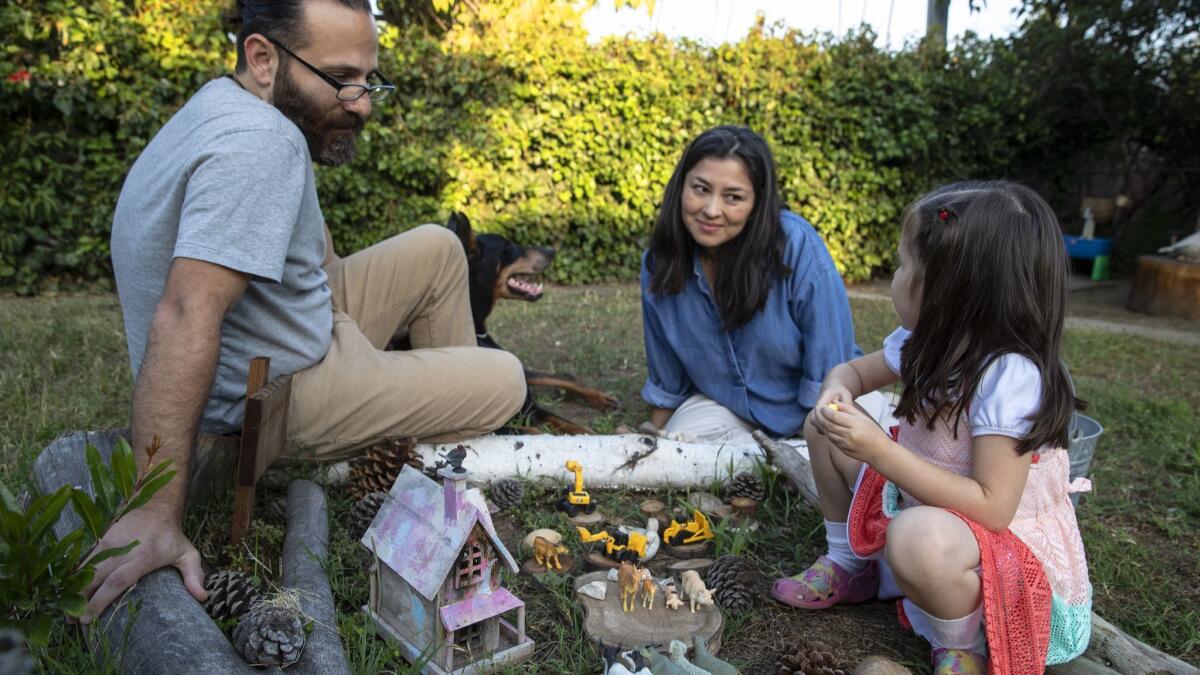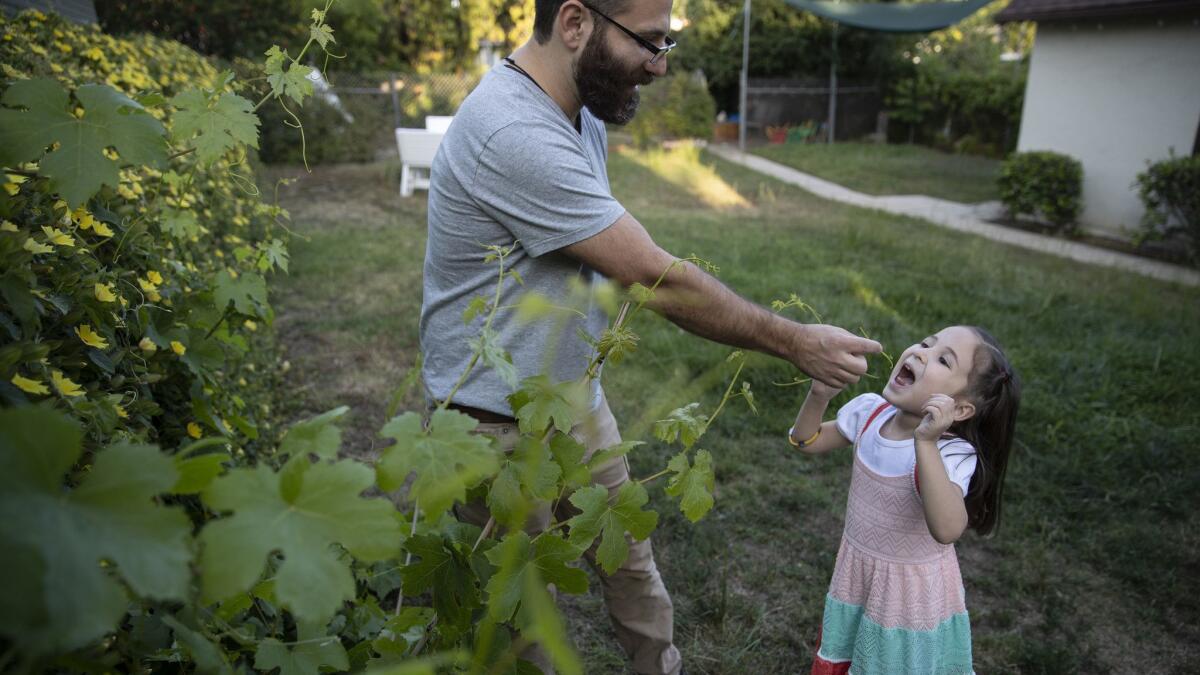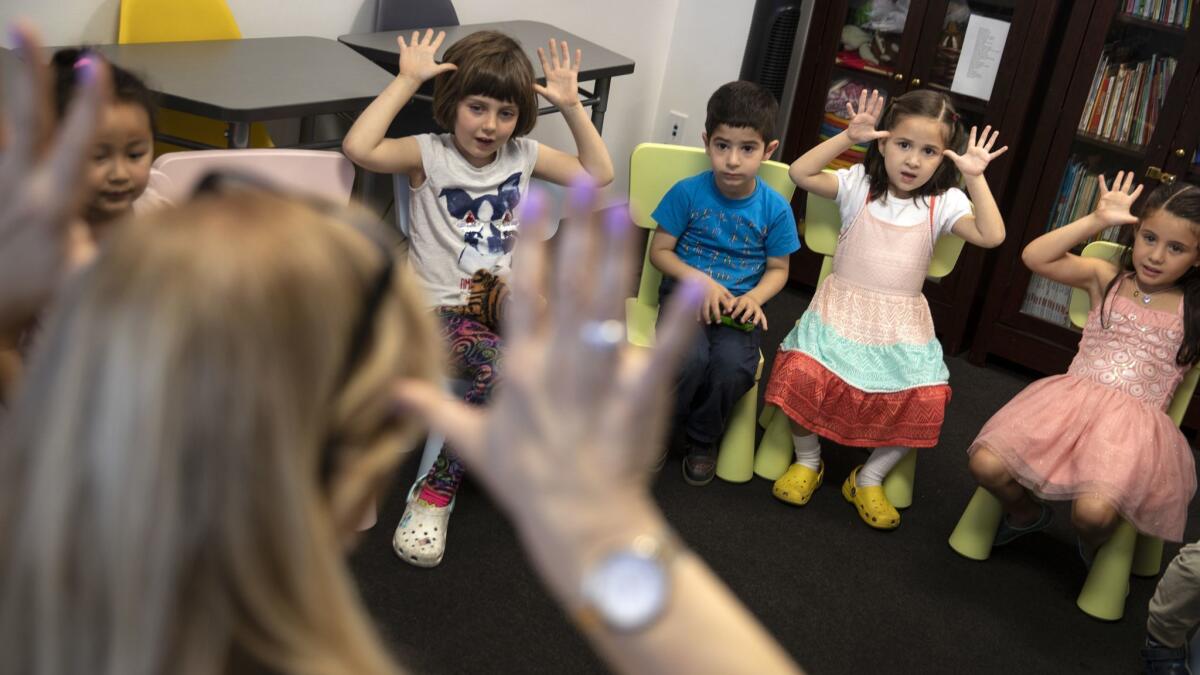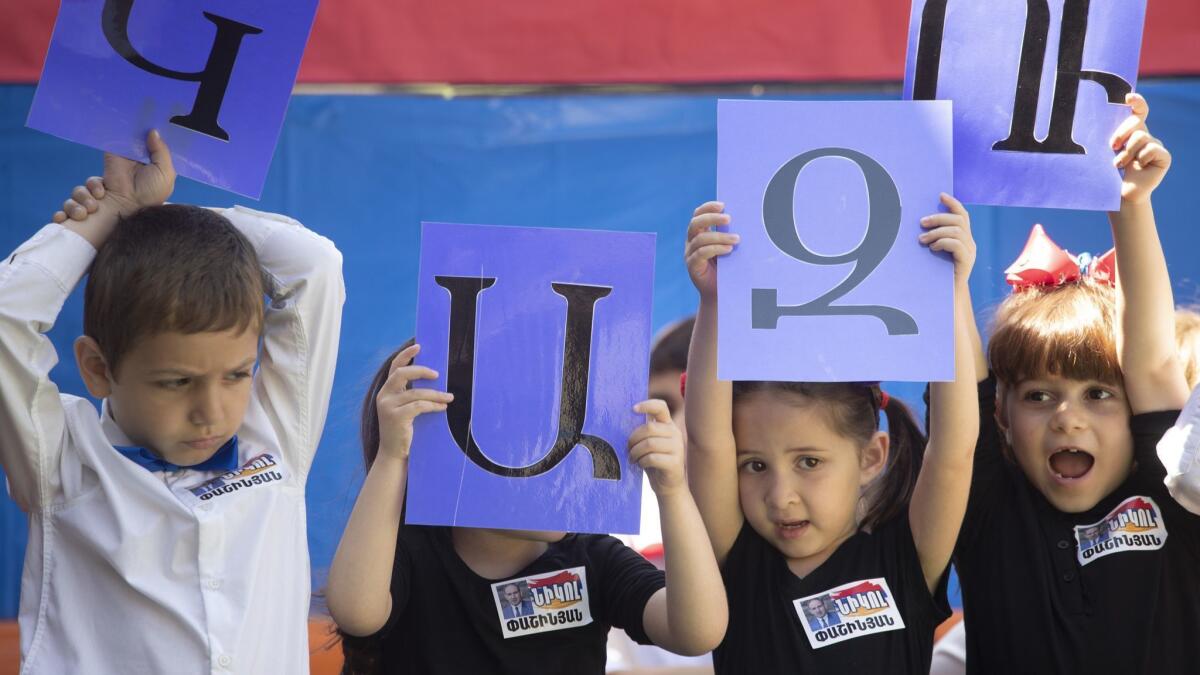Must Reads: I am raising my daughter to speak three languages. A stranger demanded I ‘speak English’ to her

Recounting the story of a stranger at the park asking a mother to speak English to her daughter.
- Share via
I felt her staring at me on the playground as I called out to my daughter.
She must be someone’s grandmother, I thought. She must be curious, as people often are.
Then she took one step toward me — pink fingernails, dark blond hair — and opened her mouth, e-nun-ci-a-ting each word.
“Speak English,” she commanded. “You’re confusing the poor girl.”
My stomach dropped. I rose from the grass and braced myself to respond. And I did.
But not before an old, familiar feeling washed over me, a mix of fear and shame I used to carry like a knapsack in grade school. I was 7 years old, just two years older than my daughter is now.
You wetback. Dirty beaner. Go back to Tijuana. You sound like Ricky Ricardo.
So many days at Lake Marie Elementary School ended the same way for me: angry and broken, waiting by the rosebushes for my mom’s beat-up blue Datsun, wearing my knockoff sneakers and cheap, ruffled dresses from the swap meet. I thought I would never catch up.
Thirty years later, I have a career, a house, a husband, two cars, two kids and a dog.
Lee este artículo en español »
I became a U.S. citizen, watched “The Sound of Music,” read Truman Capote, danced the hokey pokey, shook hands with two presidents and lived alone for five years in Oregon. I’ve looked up and memorized and practiced out loud every bizarre American idiom I’ve ever heard — cut the mustard, bite the bullet, burn the midnight oil.
I did all this, but, according to this stranger, I haven’t done enough — because I still speak Spanish.
I was in kindergarten when I left El Salvador.
My mom came first, after the civil war erupted and my grandfather was shot dead in his home. My aunt was killed and my father was exiled and my uncle disappeared — and the bodies of so many others, one by one, turned up on the cobblestone paths at sunrise.
She sent for me as soon as my visa was approved.
I arrived one summer night to a brown stucco house facing an alley in South Whittier. I was giddy to see so many faces that had left me in El Salvador — uncles, aunts, cousins I thought were gone from my life. My family gathered on the porch to welcome me and to hear me count to 10 in English.
I picked up the language fast and soon became their interpreter. They would take me to job interviews, doctor’s appointments, government offices and the DMV.
I was a superhero, dashing back and forth between two worlds. I knew then Spanish would always be a part of me.
When I grew up and got married, my husband felt the same way about his first language — Armenian.

We would have long discussions about passing on our native tongues to our children.
But how do you raise a trilingual child? A child who can weave in and out of three different languages, writing systems and cultures?
When I got pregnant in 2012, I made it my mission to find out.
I scoured the internet, consulted with pediatricians and attended panel discussions with child psychologists. All the while I kept thinking how laughable my hunt would seem to so many of the world’s polyglots.
Experts all told me the same thing: Your newborn’s mind will be wide open. She will tune herself to any language she’s exposed to by those who care for her. She will know when to switch based on the sounds she picks up from each individual voice.
The key, I was told, was for each parent to stick to one language.
I committed to speaking only Spanish to our daughter. My husband committed to Armenian.
The evening we brought our newborn home was one of the most awkward nights in our marriage.
We settled into our king-size bed to caress our baby and cuddle. David spoke softly to her. I did, too.
But we couldn’t understand each other’s words. It felt lonely. And it would feel that way, off and on, for years.
Still, we knew if we held fast, our efforts would pay off for our child. Her world would be infinitely bigger.

Those first couple of years, English was an ocean tide, lapping ever closer to our home’s front door.
Our relatives would come over and speak English to our daughter. They bought her books in English and flipped the channels to English-language cartoons. Her cousins, on both sides, were being raised almost exclusively in English.
David and I became cops, constantly demanding that our relatives switch back to Spanish and Armenian.
It made me think about a story I wrote during that time — about how hard it was for professional Latinos to keep their kids speaking Spanish.
Some parents left the task to abuelita. Some didn’t think their Spanish was good enough or said they weren’t around enough Spanish speakers. Others worried that if they pushed Spanish too much, their kids would fall behind in English.
Several of my close friends made choices that left them with a mix of doubt, guilt and resignation.
Occasionally, David would waver and think maybe it’s rude to speak Armenian in places where people don’t understand. Sometimes, he would shift to English with our daughter.
I would tell him not to do that. “Teach her to speak it proudly, no matter where she is.”
Before the age of 2, our little girl with big brown eyes and enormous cheeks began to do just that.
Mama, lechita! Papa, katik! Besito, pachik, perro, shunik.
Her words were gems that came from her mouth in sets of two — one for mama, one for papa.
In time, she began to string them together into sentences, moving effortlessly between both languages.
She would make up poems about el sol in Spanish and sing her favorite Armenian song, “Im Poqrik Navak,” at the top of her lungs in the kitchen. She would translate for me at Armenian bakeries, and when her grandmothers were together, she would translate between them.
One day, when our daughter was almost 4, a neighbor noticed her shiny gold sneakers.
“Those are so cool,” she said to our girl, who answered in English, “Yes, my mom got them at the mall.”
My jaw dropped. This was the first time I’d heard her speak English. Where the heck did that come from?
Soon she started preschool, and English was all she spoke there and during playtime with cousins.
Language became something she couldn’t get enough of. She excavated words like some kids excavate faux dinosaur bones.
“Mama, did you know there’s lots of ways to say grass in Spanish? Grama, zacate, césped, pasto, monte.”
Mama, have you heard the word gargantüésco before? It means big. Like really big.”
“Mama, how do you say caterpillar in Spanish? What about in Armenian? What about in Russian?”
“I don’t know,” I’d tell her. “Let’s look it up.”
About a year ago, we were at the dinner table with our daughter and her 2-year-old brother when she made an announcement.
It was about Dohmerrish, her imaginary friend, a redheaded, freckle-faced French boy.
“He’s going to live with us,” she said. “I need to learn French so I can talk to him.”
OK, we said, and enrolled her in French lessons.

Back at the La Mirada playground, I looked at the woman. She knew nothing about me and my daughter.
“You don’t need to worry about my child,” I told her. She speaks English, Armenian and Spanish and is learning a fourth language.
“How many languages do you speak?” I asked.
“I speak Een-glish,” she told me, hand on hip. “That’s what matters.”
Then she asked how well my daughter could know any of her languages — to which I replied, smiling, “You would be surprised.”
That evening, with a mix of emotions, I described the encounter on Twitter.
What came next stunned me.
This was a few days before communicating in my first language became a national flashpoint — before a New York lawyer heard a group speaking Spanish and threatened to call Immigration and Customs Enforcement, before a Border Patrol agent near the border in Montana heard two U.S. citizens speaking Spanish and detained them.
Within hours my first tweet went viral. It was retweeted nearly 80,000 times, ultimately reaching millions.
Thousands of people across the world chimed in with their views on language, on America, on identity and culture.
Nkululeko Sizwe from South Africa: In Johannesburg … most young Africans speak 3 or more languages. I speak 6/7 (and I was raised in Namibia).
Natasha Carlyon from Atlanta: Unfortunately, people told my mom to stop speaking to me in Korean, and she listened. She regrets the decision. I’m now trying to learn Korean.
Annu Jalais from India: Good for you. My 4 yr old also speaks 4 languages & it is only monolinguals (the French, Americans, British) who keep telling me “all” these languages will confuse him.
Charlie Kelly from Pittsburgh: The more languages the better! forever wishing i was multilingual.
John Wallace from Texas: Those who scold others about which language they speak in a free country have a strange definition of “freedom.”
Please adopt me!! I promise I’ll clean my room and even ... help with dusting.
Bravo, mama.
Your daughter is my hero!
The comments kept coming for days, 20, 30 at a time.
“This is crazy,” I kept telling David as my phone buzzed and buzzed.
In this sea of voices, just about all of them positive, that one woman’s voice faded out.
I could hardly remember what she looked like.
All I knew was that my kids would be just fine.

More to Read
Sign up for Essential California
The most important California stories and recommendations in your inbox every morning.
You may occasionally receive promotional content from the Los Angeles Times.











